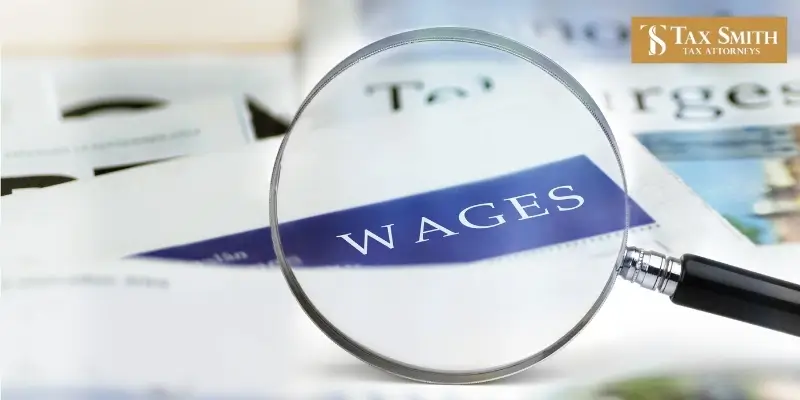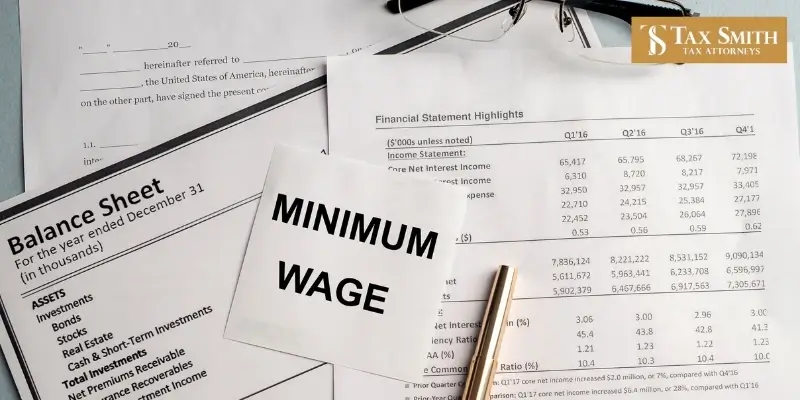1548 The Greens Way – Ste. 4 Jacksonville Beach FL 32250
Sarasota Wage Garnishment Lawyer
Sarasota Wage Garnishment Attorney
If you have not paid your taxes to the Internal Revenue Service (IRS) or the Florida Department of Revenue (DOR) and have ignored requests for payment, you could find yourself facing wage garnishment. This occurs when a tax agency takes a portion of your income to cover your debt. It can be very financially straining. A Sarasota wage garnishment lawyer can help taxpayers review their options for resolving wage garnishment when it is causing financial hardship.

TaxSmith, LLC: Navigating Wage Garnishment in Sarasota
At TaxSmith, LLC, we have decades of combined experience in tax law. We understand how stressful taxes can be for any taxpayer and how easy it is to get behind on your taxes. Ignoring your tax debt only makes the situation worse, however. If you bring your case to us, we can help you review your options. By taking action quickly, you may be able to limit the financial consequences and avoid further collection actions.
It can be stressful to deal with wage garnishment. TaxSmith, LLC, wants to help you mitigate this stress and potentially resolve your tax debt issues.
How Wage Garnishment Happens
In the Fiscal Year 2024, the IRS assessed more than $7.8 billion in failure to pay penalties for individual, estate, and trust income taxes. If you owe unpaid taxes and have ignored attempts to contact you and requests for payment, the IRS or DOR may garnish your wages to recover the debt. The IRS made more than 313,000 requests of third parties for levies in 2024, which include bank levies, wage levies, and levies of other assets.
The IRS will contact your employer to inform them of your tax debt, and your employer is legally required to comply and send a portion of your wages directly to the IRS. This garnishment can cover many types of income, including hourly wages, salary, bonuses, commissions, and more. Unlike other creditors, tax agencies don’t need court approval.
Depending on the significance of your debt, the IRS may do more than garnish your wages. It could take other actions, such as placing liens on your property or levying on your bank account. This can further worsen your financial situation. That is why it is important to take action quickly if your wages are being garnished or you have received a tax bill.
What Is the Head of Household Exemption?
In Florida, certain taxpayers may qualify for the head of household exemption, which can limit the amount of garnishment allowed. You are considered the head of the household if you provide over half the support for a child or dependent living in the home. You must file for this exemption. It is not automatically given to you.
If you qualify, any disposable earnings you make that are equal to or less than $750 a week are exempt from garnishment. For disposable earnings greater than $750 a week, you have to agree in writing to any garnishment. Talking through your situation with an attorney can help you determine whether agreeing to a garnishment is the right option or if there are other options for addressing your debt.
Other Options for Resolving Wage Garnishment
The IRS is open to negotiating taxes, particularly when it is causing financial hardship. The IRS helped nearly 62.2 million taxpayers in 2024 with their taxes, either over the phone or from Taxpayer Assistance Centers. The IRS Taxpayer Assistance Center in Sarasota is located at 5971 Cattleridge Boulevard. An attorney can help you prepare for a meeting at this location or represent your interests.
The most effective way to resolve wage garnishment is to pay the debt in full. If you cannot financially do that, there could be other solutions. An attorney can also talk you through your options for addressing wage garnishment, such as:
- Negotiating for a lower amount of garnishment
- Resolving the debt, such as through an installment agreement, penalty abatement, or an offer in compromise
- Filing for certain types of bankruptcy can prevent wage garnishment
Working with an experienced tax attorney can help you determine the right option when you are facing garnishment by the IRS or DOR.

FAQs About Sarasota, FL Wage Garnishment Law
How Do You Write a Hardship Letter for Wage Garnishment?
A hardship letter or call should provide important financial information to prove your claims of hardship. If a wage garnishment is placed by the IRS, you can contact them to explain your financial situation. You may qualify for financial hardship if the IRS determines that the garnishment stops you from meeting your basic living needs. When you work with an attorney, they can help you gather the right information and help prove hardship.
Can Someone Garnish My Wages Without Me Knowing?
Most creditors need to get court approval to garnish your wages, and so you will be served with papers when they file with the court. Other creditors, such as state and federal tax agencies, do not need court approval. However, this does not mean you will not get a notice. The IRS or Florida DOR will not immediately garnish your wages when you have unpaid taxes. First, they will send you a notice of nonpayment.
What Is Exempt From Garnishment in Florida?
Wage garnishment in Florida covers many different types of income, but garnishment typically only affects a portion of your income. If you qualify and file for certain exemptions, such as the head of household exemption, you can prevent some or all garnishment of your wages.
Most creditors are only able to garnish 25% of your wages, or 30 times the federal minimum wage, whichever is greater, which limits how much income they can garnish.
Can My Bank Account Be Garnished Without Notice?
Your bank account could be garnished without notice from the court for debts such as state or federal taxes or unpaid child support. However, garnishment is likely not the first step the court or tax agency will take. You will likely receive bills and requests for payment prior to this happening. If you do not, or a different creditor garnishes your wages without notice, you may be experiencing illegal garnishment. An attorney can help you navigate this.
Addressing Wage Garnishment Quickly
There could be methods to prevent wage garnishment, but it is important to act quickly. The IRS is open to negotiations, and TaxSmith, LLC can help you prepare for these negotiations or represent your interests to the IRS. Contact our firm today to see how we can help you.
Locations We Serve
- Alabama
- Arizona
- California
- Colorado
- Connecticut
- Delaware
- District of Columbia
- Florida – HQ
- Georgia
- Idaho
- Illinois
- Indiana
REQUEST A CONSULTATION
Please fill out the Contact Request Form and a Tax Attorney/Paralegal will call you
to discuss legal representation or to schedule your free initial consultation





